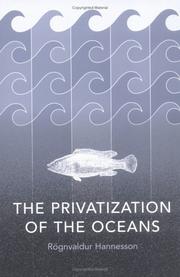| Listing 1 - 1 of 1 |
Sort by
|

ISBN: 0262274868 1417574356 9780262274869 9781417574353 0262083345 9780262083348 0262582651 9780262582650 Year: 2004 Publisher: Cambridge : MIT press:
Abstract | Keywords | Export | Availability | Bookmark
 Loading...
Loading...Choose an application
- Reference Manager
- EndNote
- RefWorks (Direct export to RefWorks)
Rich with detail and provocatively argued, this study of the development of property rights in the world's fisheries tells the story of one industry's evolution and provides a useful illustration of the forces that shape economic institutions. The emergence of exclusive individual rights of access in the fishing industry began after the revolution in the international law of the sea that took place in the 1970s, when the offshore area controlled by a nation for fish and other resources expanded from 3 miles to 200 miles. Rognvaldur Hannesson compares the subsequent development of private property rights in the fisheries to the historic enclosures and clearances of common land in England and Scotland and finds many parallels, including bitter fights over access rights and the impossibility of accommodating all those who want to stake a claim. Overall benefit to society in the form of increased efficiency, he points out, does not mean that all benefit equally. After tracing the development of the law of the sea since the sixteenth century, Hannesson considers what form property rights in fisheries might take and examines the forces behind the establishment of exclusive use rights to fish. He argues that one form of exclusive use rights, individual transferable quotas (ITQs), best promotes efficiency in the use of fish resources. He presents case studies of ITQ development, ranging from successful establishment in Canada and New Zealand to failures in Chile and Norway to experiments with ITQs in Iceland and the United States. The development of economic institutions, he concludes, is an evolutionary process subject to contradictory influences.
Fishery management --- Fisheries --- Economic aspects. --- Limited entry licenses. --- Groundfish fisheries --- Limited entry licenses in fisheries --- Limited entry permits in fisheries --- Pacific halibut fisheries --- Fish management --- Fisheries management --- Fishery resources --- Licenses --- Limited entry --- Limited entry permits --- Limited entry licenses --- Management --- Aquatic resources --- Wildlife management --- Fish counting towers --- Overfishing --- ECONOMICS/Political Economy --- ECONOMICS/Environmental Economics
| Listing 1 - 1 of 1 |
Sort by
|

 Search
Search Feedback
Feedback About UniCat
About UniCat  Help
Help News
News